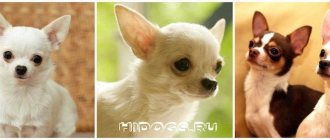A rational approach to choosing a dog
If you are firmly convinced that you are ready to have a four-legged friend, then you should not immediately rush to buy a puppy, guided by an emotional impulse. This is a reason to move on to the next step of making an informed decision.
At this stage you need:
- evaluate your lifestyle and realize what changes will occur in it with the appearance of a pet;
- determine the size of the dog;
- listen to the wishes and arguments of all family members.
When choosing a dog, and asking yourself the question of how to choose a dog, it is extremely important to think through everything to the smallest detail in order to avoid unpleasant surprises in the future. After all, you are not choosing a pet, but a new family member who will become your friend for many years.
Choose a dog breed for yourself or change yourself to suit the breed. Part 1 (1 photo)
Author: LenchenShikhowa
23 August 2021 18:04
Community: Animals
Tags: DOSAAF Trained dog German shepherd animals shepherds pets service dogs dogs
475
1
Many canine books contain advice on how to choose the right dog breed for yourself. Dog handlers and experienced owners who have raised more than one pet speak about the need to choose a breed wisely. When choosing a breed, you need to take into account your character, habits, lifestyle, temperament, financial situation and many other factors.
You can’t just fall for the first breed you like in appearance without studying its characteristics and comparing it with your own life realities. Neglect of this point leads to a huge number of abandoned dogs in all breeds, candidates for euthanasia, and dogs simply thrown out onto the street, crippled mentally and physically. And I, too, have spoken and written about this more than once in different places on the Internet. But for me, everything was completely different. A short prologue: For as long as I can remember, and I remember myself since I was 10 months old, I have always wanted a dog. The very first appearance of a dog lover among people happened at the age of about 1.5 years, when I told my mother: “I want a dog, buy a dog!” “Okay,” my mother answered, went to the store and bought a plastic dog. I waited impatiently - now they will bring me a dog! Imagine my disappointment when I saw what my mother brought from the store. It didn’t even occur to me that a parent might take my words as if I wanted a toy. I wanted a real dog that runs, barks, wags its tail, has fur and is alive! But it couldn’t occur to her that the ditachka meant a living, real dog, and not a silent piece of plastic. In general, there was a mutual misunderstanding that lasted for many years. It had to happen that a dog lover was born into a family of absolute non-dog lovers. Yes, that's it. I decided on my favorite breed almost immediately, as soon as they started walking me in a stroller around the nearby squares and streets and I began to observe the world around me. Of course, it was a shepherd. In Soviet times, there was no need to add that this was a German or East European shepherd. They simply said “shepherd,” and everyone immediately understood what kind of dog they meant. The appearance of the shepherd delighted me. Standing, sensitively alert triangular ears; incredibly intelligent, almost human brown eyes, carefully observing everything and everyone; slightly sloping pasterns; a smooth, slightly curved fluffy tail, reminiscent of a saber, densely covered with hair. A stunningly beautiful stance, when the front legs stand together, and the hind legs - one is pulled back, and the other is slightly moved forward. This stance creates the impression of concentration, swiftness and strength; the feeling of an elastic spring that will straighten out at any moment. A stretched arrow, ready to break from the string. And the eyebrows, and the black mask covering the entire face, and the ears like a house on the growing shepherd dogs! The Shepherd seemed to me the ideal dog, the standard dog. This is perfection in every line, in every movement, in every hair. Of course, as a child, I could not express my thoughts the way I do now, but only felt that when I saw a shepherd, my heart beat faster, a lump appeared in my throat and something was squeezing in my chest. I looked at every shepherd I met with a look full of delight, adoration and envy and dreamed that someday I would have such a dog. The shepherd is very similar to a wolf, and at the same time it is immediately clear that this is a dog - tame, domestic, faithful, ready at any second to rush to carry out the owner’s command. All shepherd colors seemed equally beautiful to me and I couldn’t choose which one my dog should have. Let it be any or all at once. The main thing is that the shepherd!
0
Article from "Young Naturalist". I cut out everything about dogs. I still have these articles.
Source:
Related links:
- 10 years of loneliness: Britain's 'loneliest dog' finds owners
- The dog adopted a tailed orphan
- The guy was fascinated by someone else's dog, and he jokingly asked the owner to give it to him
- 30 charming paintings by four-legged artists
- The dog with a bite-stricken muzzle was looking forward to people who would love him.
subscribe to the Animals community
Tags: DOSAAF Trained dog German shepherd animals shepherds pets service dogs dogs
Did you like the post? Support Chips, click:
5 5 0
Liked
0 0
24
Partner news
Boy or girl
From the very beginning, decide on the gender of the dog. Because males and females of the same breed differ from each other not only physiologically, but also behaviorally.
For example, bitches become more attached to the family. They are more flexible and easier to raise and train. Bitches experience sexual desire twice a year. But there is a risk of unplanned pregnancy.
Males, in turn, are more active and dominant natures, capable of making independent decisions. But they are interested in the opposite sex all year round.
What is the purpose of buying a dog?
Buying a dog on the basis of “like it or not” is a bad option. Agree that purchasing a Moscow guard dog to keep in a small apartment or a Chihuahua to guard a private home is not the best idea. Each dog breed has its own goals and purposes.
If you are planning to buy a dog as a pet and you do not need your ward to show guard or hunting skills, then decorative breeds are suitable for you:
- Yorkshire Terrier
- Chinese Crested
- Löwchen
- pomeranian spitz
- Russian toy terrier
The following dog breeds are excellent for apartment security:
- american pit bull terrier
- miniature schnauzer
- samoyed husky
- Akita Inu
- Chinese Shar Pei
To protect your home, it is better to choose among the dog breeds that can be kept in an enclosure:
- Alabai
- American Akita
- Alaskan Malamute
- German Shepherd
- Caucasian Shepherd Dog
If you are an avid hunter and are choosing an assistant, then you need to pay attention to the following dog breeds:
- english foxhound
- basenji
- Kerry Blue Terrier
- shorthaired pointer
- Russian hound
If you are choosing a dog for a child, then the following dog breeds are suitable for you:
- beagle
- collie
- Irish Setter
- Labrador
- French Bulldog
The following dog breeds are good as companions for active people:
- english setter
- biyi
- welsh corgi
- Jack Russell Terrier
- mexican hairless dog
For older people, it is better to choose calm dog breeds:
- English bulldog
- Biewer Yorkshire Terrier
- lapdog
- Golden retriever
- Cavalier King Charles Spaniel
If you or someone close to you is allergic to dog hair, then the following are suitable for you:
- American Hairless Terrier
- bull terrier
- Italian Greyhound
- poodle
- Saluki
If by purchasing a dog you want to emphasize your status and position in society, then you need to choose an exclusive breed:
- bichon frize
- norfolk terrier
- affenpinscher
- pharaoh hound
- Tibetan mastiff
For novice dog breeders, dogs that are easy to train are an excellent choice:
- Sheltie
- english toy terrier
- pug
- miniature schnauzer
- American Cocker Spaniel
When choosing a four-legged friend, you also need to decide on the class of your future pet. Show-class dogs are the pride of any breeder and their prices are the highest. Show class puppies are the standard of the breed. They have no shortcomings and have great exhibition prospects. Show class puppies are worth buying only if you are planning a grandiose show career for your dog.
Breed-class dogs are the basis of breeding. Breed-class animals have an excellent pedigree, excellent exterior within the acceptable deviations of the breed standard, excellent health and impeccable reproductive hereditary characteristics. The price for breeding class puppies depends on the breed and gender.
Pet-class dogs include animals that do not meet the breed standard and cannot take part in exhibitions. Pet-class puppies are rejected due to incorrect coloring, lack of height and other characteristics that do not threaten the health and quality of life of the animal. But due to such inconsistencies with the breed, breeders do not use such dogs for breeding. The cost of such puppies is significantly lower than show or breeding class puppies.
You can also buy unscheduled puppies, mixed breeds or outbreds.
For what purposes do you need a dog?
The desire to become the owner of a four-legged pet rarely has certain criteria. In most cases, this is simply the need to take care of the puppy, the desire to teach him and raise a faithful and devoted friend. But a mistake in choosing a breed can ruin the brightest and most rosy plans, as well as nullify all the efforts made.
All dogs are conditionally divided into several groups. And depending on their membership in a particular group, they have common character traits:
Hunting. Active, good-natured and sociable. But they need long walks and are unlikely to become worthy guards. Not very suitable for people leading a calm and measured lifestyle. But for lovers of active recreation and hiking, hunters and fishermen, they will be ideal companions.
Decorative. They have a calm and phlegmatic disposition. They easily learn to go to the toilet in a diaper and are devoted to their owners. They require daily care of their skin and coat, are often picky in their choice of diet and suffer from allergic reactions. An ideal choice for an elderly couple or single person;
Sentinels. Dogs with tenacity, intelligence and the ability to protect not only themselves, but also their owner. They need an owner with a strong-willed character who is able to force such a dog to obey. The pet needs serious training and an active lifestyle. Not the most suitable option for apartment living, families with children or for a novice dog breeder.
Companions. An irreplaceable friend who is ready to accompany his owner anywhere and everywhere. They have an unobtrusive and friendly character. They need attention and cannot stand loneliness.
This is important: when choosing a breed, you should also pay attention to the length and thickness of the coat, the frequency and intensity of shedding, as well as the risk of developing allergic reactions or other chronic diseases inherent in the breed.
You may find our article useful: Classification of dog breeds
You should also evaluate the possibility of the dog living in a city apartment or the possibility of him being in an enclosure. Pay attention to our article: TOP 30 dog breeds for living in an apartment
Where to buy a dog
Many people, not knowing where to buy a purebred puppy, go to the poultry market. Then they find out that the animal has neither documents nor vaccinations. Therefore, if you want to avoid scammers and buy a purebred dog, it is better to contact a club or kennel. The club will advise you on a responsible breeder from whom you can buy a dog.
You can also find information about nurseries on the Internet on notice boards, and read reviews about them on social networks.
Whatever purchase option you choose, ask the seller to show you documents: the puppy’s pedigree and a passport with vaccinations. If you buy a dog without a pedigree, it must have a veterinary passport in any case.
Choosing a puppy: appearance, living conditions
Once the breed and preferred sex of the baby has been chosen, you should visit a potential breeder. Dog handlers recommend not agreeing to a photographic examination or transfer of a pet outside the home.
This approach has a number of advantages for an unscrupulous breeder:
- The buyer cannot evaluate all puppies in the litter;
- Does not see the conditions of detention (possible unsanitary conditions, which will lead to weakening of the immune system);
- It is not possible to evaluate the appearance of the bitch (this makes it possible to hide an emaciated or old animal that was used for breeding contrary to common sense. In this case, the offspring cannot be strong and healthy).
But what to do if the buyer cannot independently determine the quality of the living conditions and how well the litter meets the breed standards? Dog handlers recommend taking a more experienced breeder with you. Or seek help from a club that specializes in breeding this breed.
After visiting the breeder, the buyer should pay attention to:
- Appearance of babies. Well-fed puppies, with good coat, clean eyes and ears, and no nasal discharge - a sign of a conscientious breeder. An important factor is the absence of ectoparasites. This means that puppies are regularly treated for fleas and the breeder follows the recommendations of veterinarians;
- Ask to see your mother . If the bitch is in good physical shape, is not exhausted and is not elderly, then the likelihood of producing strong and healthy offspring increases;
- Request a photo of the father . It is unlikely that he is kept in the same family, but this gives at least a small chance to see the second parent and evaluate his external characteristics; Look at the mother's documents, the veterinary passport of the selected puppy, as well as permission for planned mating (if you plan to use the baby for exhibitions and subsequent breeding).
This is important: A conscientious breeder has nothing to hide from buyers. Therefore, it will not only allow you to inspect the conditions of detention and study documents, but will also provide complete information on how to properly raise, feed and care for your four-legged pet. By maintaining contact with the breeder, the new owner can always receive the necessary support and answers to his questions.
We recommend reading our article: Where and how to buy a dog. Choosing the right pet
How to choose a healthy puppy
All the preparatory stages are over and the exciting moment of directly choosing a dog has arrived. How not to make a mistake and choose a healthy puppy? First, watch how the puppy behaves. Healthy babies are active and inquisitive, they strive to explore everything that comes into their field of vision.
- Reach out your hand to the puppy and watch his reaction. A mentally balanced baby will sniff the hand and may try to taste it. Aggressive puppies will begin to growl, and timid ones will hide;
- Secondly, take a closer look at how the dog moves. If the puppy moves uncertainly, falls to the side, jumps like a bunny, throws back its head or shakes, then this is most likely a sick animal;
- Third, examine the puppy's eyes, ears, teeth, fur, and anus. A healthy baby's mucous membranes are an even pink color, his eyes are clear and vibrant, his ears are clean, his fur is uniform without bald patches, and there should be no traces of feces on his bottom.
If you have any doubts about the puppy's health, it is better to postpone the purchase and contact another seller.
Remember that a dog is not only a person’s friend, but also a reflection of the essence of its owner. Therefore, choose a ward who matches yourself, your character and lifestyle. Then it will be much easier for you to find a common language and establish contact with your four-legged friend.
Who to choose - male or female
Dog experts do not give a clear answer to this question. Some breeders prefer exclusively males, while others prefer raising females. Keeping both has its pros and cons, which should be taken into account when choosing a puppy.
Advantages of owning male dogs:
- Endurance;
- Can be kept in simpler conditions;
- A high level of performance is observed throughout the year;
- Stable character, without outbursts of aggression associated with a physiological state.
It should also be noted the disadvantages that will invariably accompany keeping a male dog:
- Tendency to dominate. The dog will regularly strive to seize power and establish superiority over its owner;
- Training boys takes more time from the owner and is somewhat more difficult than training a bitch;
- Tend to avoid following commands flawlessly;
- In the presence of a female dog in heat, there is a clear tendency to run away and a decrease in attention.
If the future owner is not ready to regularly prove his superiority to the dog and control the male, then choosing a female dog would be a good option.
Advantages of owning a bitch:
- They learn much easier and quickly grasp the essence of the new team;
- Less aggressive and not prone to dominance;
- They get along better with children and become indispensable participants in games.
When choosing a bitch, you should also remember a number of difficulties that you will have to face in the process of keeping her:
- Decreased performance during estrus, as well as during pregnancy and lactation;
- Refusal to use the bitch for protective guard duty, as well as the inability to take her hunting, on long walks or travel, starting from the second half of pregnancy and throughout the entire period of feeding babies;
- Relatively low endurance levels.
The future owner should approach the process of choosing the gender of his four-legged friend as carefully as possible. This will avoid unpleasant surprises during the training and subsequent maintenance of the dog.











